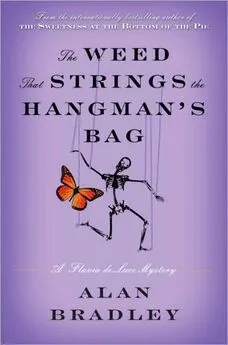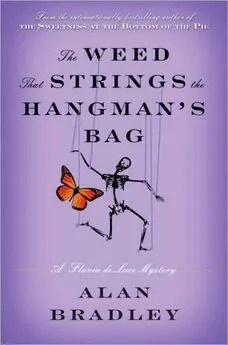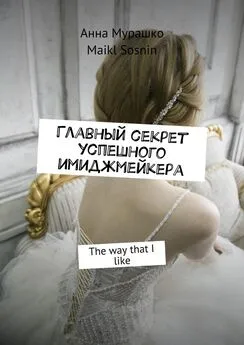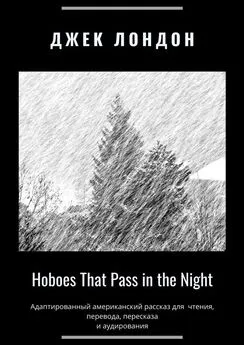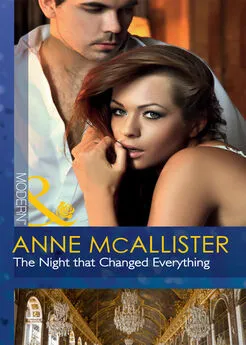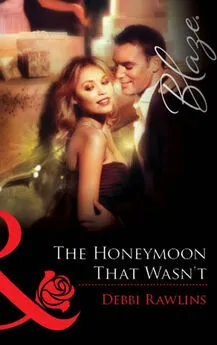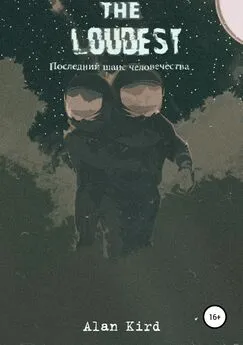Alan Bradley - The Weed That Strings the Hangman's Bag
- Название:The Weed That Strings the Hangman's Bag
- Автор:
- Жанр:
- Издательство:неизвестно
- Год:неизвестен
- ISBN:нет данных
- Рейтинг:
- Избранное:Добавить в избранное
-
Отзывы:
-
Ваша оценка:
Alan Bradley - The Weed That Strings the Hangman's Bag краткое содержание
The Weed That Strings the Hangman's Bag - читать онлайн бесплатно полную версию (весь текст целиком)
Интервал:
Закладка:
"She went into the hall, and using the corridor to the left, and locking the door behind her, went up the two short flights of steps to the stage.
"She climbed up onto the bridge of the puppet stage, and scraped away the insulation from the wiring, using the bicycle clip as a kind of spoke-shave. Then she slipped the clip over the wooden framework of the stage, touching the bared electrical wire on the one side and the metal rod that released Galligantus on the other. Bob's your uncle! That's all there was to it. If you've had a close look at the clip, you've likely already found a small abrasion mark on the inside center — and perhaps slight traces of copper."
"S'truth!" Sergeant Woolmer let slip, and Inspector Hewitt shot him a look.
"Unlike most of the other suspects — except Dieter, of course, who built wireless sets as a boy in Germany — Grace Ingleby had the necessary electrical training. Before the war, before marrying Gordon, she worked in a factory installing radio sets in Spitfires. I've been told that her IQ is nearly equal in number to the Psalms."
"Dammit!" Inspector Hewitt shouted, leaping to his feet. "Sorry, Vicar. But why haven't we found these things out, Sergeant?"
He glared from one of his men to the other, including both in his exasperation.
"With respect, sir," Sergeant Woolmer ventured, "it could be because we're not Miss de Luce."
It was a bold thing to say, and a rash one. If what I'd seen in the pictures at the cinema were true, it was the sort of remark that could result in the sergeant becoming a road-mender before sunset.
After a nerve-racking silence, the Inspector said, "You're right, of course, Sergeant. We don't have the same entree to the homes and hearths of Bishop's Lacey, do we? It's an area in which we could do better. Make a note of it."
No wonder his subordinates adored him!
"Yes, sir," said Sergeant Graves, scribbling something in his notebook.
"Then," I went on, "having set the trap, Grace went out by the hallway door at the right of the stage, and she locked that one, too — probably to keep anyone from going backstage and discovering what she had done. Not that anyone would, of course, but I expect she was under a great deal of stress. She's been planning to take her revenge on Rupert for a long time. It wasn't until she spotted the vicar's trouser clip on the floor that she saw exactly how it could be done. As I've said, she's a very intelligent woman."
"But," Inspector Hewitt said, "if both doors were locked, how did Porson get up onto the stage for the performance? He couldn't have locked himself in because he didn't have the key."
"He used that little staircase in front of the stage," I said. "It's not as steep as the two in the side halls, and it's only a single flight. Narrow stairs were difficult for Rupert because of his leg brace, and he took the shortest route. I noticed that about him last Thursday when he was checking the hall's acoustics."
"Quite an ingenious theory," Inspector Hewitt remarked. "But it doesn't explain everything. How, for instance, would the alleged murderer know that such a gimcrack bit of tin would result in Porson's death?"
"Because Rupert always leaned on a rail of iron piping as he operated the puppets. With all the lighting equipment that was hung backstage, the railing had to be grounded through the mains. The instant Rupert touched the live Galligantus lever, his lower body pressed tight against the rail as it was, with his right leg clamped in an iron brace, the current would have shot straight up his arm and through — "
"His heart," said the Inspector. "Yes, I see."
"Rather like Saint Lawrence," I said, "who, as you know, was done to death on a grill."
"Thank you, Flavia," Inspector Hewitt said. "I think you've made your point."
"Yes," I said, rather smugly, "so do I. Will that be all, then?"
Sergeant Graves was grinning away over his notebook like Scrooge over his ledgers.
Inspector Hewitt wrinkled his brow in a look that I had seen before: a look of exasperated curiosity held in firm check by years of training and a strong sense of duty.
"I think so, yes — except for one or two small points, perhaps."
I gave him that beaming, superior smile: all teeth and thin lips. I almost hated myself for doing it.
"Yes, Inspector?"
He walked to the window, his hands clasped behind his back, as I had seen him do before on several occasions. At last he turned: "Perhaps I'm a bit of a dim bulb," he said.
If he was waiting for me to contradict him, he'd be waiting until the cows came home in purple pajamas.
"Your observations on the death of Rupert Porson have been most illuminating. But try as I may, I have failed utterly to follow your reasoning in the death of Robin Ingleby.
"The boots, yes ... perhaps. It's a possibility, I admit, but far from a certainty. Slender evidence when it comes to court. If the case is reopened, that is. But we shall require far more than a pair of child's boots if we are to prevail again upon their Lordships."
His tone was almost pleading. I had already decided that there were certain observations that would remain forever locked away in my brain: choice nuggets of deduction that I would keep for my own private delectation. After all, the Inspector had far more resources at his disposal than I did.
But then I thought of his beautiful wife, Antigone. Whatever would she think of me if she found that I had thwarted him? One thing was certain: It would scotch any idea I might have had of sipping tea in the garden of their tastefully decorated maisonette.
"Very well," I said reluctantly. "There are a few more points. The first is this: When Dieter went running back to the farmyard, having just discovered Robin's dead body hanging in Gibbet Wood, the windows of the house were empty. No one was awaiting his arrival, as might have been expected. Surely the mother of a missing child would be frantic, waiting for the slightest scrap of news? But Grace Ingleby wasn't keeping watch at the windows. And why not? The reason is a simple one: She already knew that Robin was dead."
Somewhere behind me, the vicar gasped.
"I see." Inspector Hewitt nodded. "An ingenious theory ... most ingenious. But still hardly enough to build a case upon."
"Granted," I agreed, "but there's more."
I looked from one of them to another: the vicar, Inspector Hewitt, and Sergeant Graves, their eager faces thrust forward, hanging upon my every word. Even the hulking Sergeant Woolmer slowed his polishing of the intricate lens.
"Robin Ingleby's hair was always a haystack," I told them. "'Tousled' is perhaps the proper word. You can see it in his photos. And yet when he was found hanging from the timbers of the old gallows, his hair was as neatly combed as if he'd just climbed down from the barber's chair. Meg captured it perfectly in her drawing. See?"
There was an intake of breath as everyone huddled over the page from my notebook.
"It was something that only a mother would do," I said. "She couldn't resist. Grace Ingleby wanted her son to be presentable when he was found, hanging by the neck, dead in Gibbet Wood."
"Good Lord!" Inspector Hewitt said.
* TWENTY-NINE *
"GOOD LORD," FATHER EXCLAIMED. "There's Broadcasting House. They've set up cameras in Portland Place."
He got up from his chair for the umpteenth time and hurried across the drawing room to twiddle with the knobs on the television receiving set.
"Please be quiet, Haviland," Aunt Felicity said. "If they were interested in your commentary, the BBC would have sent for you."
Aunt Felicity, who had barely got home to Hampstead, had hurried back again to Buckshaw as soon as the idea came into her head. She had hired the television for the occasion ("at ruinous expense," she hastened to point out), and because of it, was now enjoying vastly increased dictatorial powers.
Early in the morning of the previous day, the workmen had begun erecting a receiving aerial on the ramparts of Buckshaw.
"It needs to be high enough to pick up the signal from the new transmitting tower at Sutton Coldfield," Aunt Felicity had said, in a voice that suggested television was her own invention. "I had wanted all of us to go up to London to attend the Porson obsequies," she went on, "but when Lady Burwash let slip that the Sitwells were having in the telly ...
"No, no, don't protest, Haviland. It's educational. I'm only doing it for the good of the girls."
Several muscular workers, dressed in overalls, had lugged the set from the back of a pantechnicon and into the drawing room. There it now crouched, its single gray eye staring, like a flickering Cyclops, at those of us gathered in its baleful glow.
Daffy and Feely were huddled together on a chesterfield, feigning boredom. Father had invited the vicar and told them to watch their language.
Mrs. Mullet was enthroned in a comfortable wing-backed chair, and Dogger, who preferred not to sit in Father's presence, stood silently behind her.
"I wonder if they have televisions in Portland Place," Feely said, idly, "or whether they might, rather, be looking out their windows?"
I recognized this at once as an attempt to twit Father, whose contempt for television was legendary.
"Television is a bauble," he would reply, whenever we pleaded with him to have a receiver installed. "If God meant for pictures to be sent through the air, He'd have never given us the cinema.
"Or the National Gallery," he'd add sourly.
But in this case, he had been overruled.
"But it's History, Haviland," Aunt Felicity had said in a loud voice. "Would you have denied your daughters the opportunity to watch Henry the Fifth address his men on Crispin's Day?"
She had taken up a stance in the middle of the drawing room.
This story shall the good man teach his son;
And Crispin Crispian shall ne'er go by,
From this day to the ending of the world,
But we in it shall be remembered;
We few, we happy few, we band of brothers —
— Nonsense! — Father said, but Aunt Felicity, like Henry the Fifth, pushed on, undaunted:
For he today that sheds his blood with me
Shall be my brother; be he ne'er so vile,
This day shall gentle his condition:
And gentlemen in England now abed
Shall think themselves accursed they were not here,
And hold their manhoods cheap whiles any speaks
That fought with us upon St. Crispin's day.
— That's all very well and good, but they didn't have television in 1415, — Father had said rather sullenly, missing her point entirely.
But then, yesterday, something remarkable had happened. One of the mechanics, who had been in the drawing room with his eye intently upon the receiver, had begun calling instructions out the window to a companion on the lawn, who relayed them, in a drill-sergeant voice, to the man on the roof.
— Hold it, Harry! Back ... back ... back. No ... you've lost it. Back t'other way ...
At that very moment, Father had walked into the room, planning, I think, to heap scorn upon the entire operation, when his eye was taken by something on the snow-blown screen.
— Stop! — he shouted, and his word was passed along in ever-diminishing echoes by the mechanics, out the window and up onto the ramparts.
— By George, — he said. — It's the 1856 British Guiana. Back a little! — he shouted, waving his hands to illustrate.
Again his instructions were carried aloft in a verbal bucket brigade, and the picture cleared a little.
— Just as I thought, — he said. — I'd know it anywhere. It's coming to auction. Turn up the sound.
Читать дальшеИнтервал:
Закладка:
